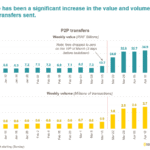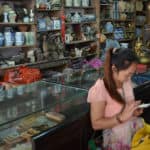Social Protection Goes Digital: Lessons From an Innovative, WhatsApp-Driven Outreach Campaign in Paraguay
When COVID-19 hit Paraguay, the crisis and its associated lockdown measures quickly reshaped the way social policy is implemented in the country. Many programs that depended on face-to-face contact to reach participants suddenly found themselves unable to conduct their usual outreach. In response, many have turned to digital channels — a shift that has caused not only challenges, but also some promising successes.
For example, consider the Tekopora program, Paraguay’s flagship conditional cash transfer initiative run by the Ministry of Social Development (MDS). The program targets people facing poverty and extreme poverty in a country where, according to INE, around 23.5% of the population lived in poverty in 2019 — a percentage that certainly increased in 2020 due to the pandemic. It currently covers approximately 45.8% of this population (around 165,000 families). From a territorial perspective, Tekopora reaches the country’s 17 departments and at least 254 districts. Its main objective is to improve the quality of life of vulnerable families and communities, facilitating their access to food, health and education, in order to cut the intergenerational transmission of poverty.
Prior to the pandemic, participants of the Tekopora cash transfer program received regular visits and training from a coach, known as a family guide, who followed up on the progress of families within the program. But with quarantine measures in place, visits and face-to-face training were temporarily suspended. Many other activities, from targeting to training to monitoring, also had to be suspended or adapted starting in March 2020.
This caused uncertainty about the coaching and training process within the program. For instance, Ña Cata (note: names in this article have been changed to protect identities), a Tekopora participant from the department of San Pedro, stated that she did not know when she was going to receive visits and support from Marta, her family guide. Similarly, Margarita, a family guide from the Central department, declared that she didn’t know how she was going to continue serving the 99 families she worked with. (These statements were among the various concerns of participants that were raised by the Tekopora field team.)
This situation presented families in the Tekopora program with a double dilemma. On the one hand, they were already dealing with the negative socioeconomic impacts of COVID-19 prevention measures dictated by the government. And on the other hand, they now faced the possibility of feeling “abandoned” by this essential public program right when they needed it most.
Using Digital Tools to Fight Poverty During the Pandemic
The pandemic has made this challenge increasingly common all over the world. Families living in poverty and extreme poverty have been forced to rethink their livelihood strategies after the major economic shock and drastic income declines the crisis has provoked. Moreover, the long period of confinement the world has endured has also had significant non-economic impacts, such as increased conflicts and gender-based violence within the home, which take a particularly heavy toll on disadvantaged populations. Making matters worse, people have had to navigate an ocean of (often bad) information, riddled with fake news, about COVID-19. The support provided by family guides such as Margarita and Marta is essential for Paraguayan families living in poverty and vulnerability, who constantly face economic, social and psychological tensions and challenges.
In this context, MDS and Fundación Capital have been working since 2019 in a five-year alliance funded by Co-Impact, to promote the social and economic inclusion of families in poverty through systems change. In response to the challenges the Tekopora program has faced, we joined forces to find a timely and scalable alternative to face-to-face training and coaching, in order to reach the thousands of participants who were suddenly deprived of any contact with their family guides. This led to “Tekopora Te Acompaña” (Tekopora Accompanies You), a digital campaign that sought to provide information and tools to prevent and mitigate the impacts of coronavirus and to ensure that families, despite the physical distance, maintained contact with the program through direct channels. Our intention was to increase these families’ capacities to face the crisis and decrease their vulnerabilities. The campaign was built on six thematic areas: food and nutrition, income and work, health and self-care, education and learning, housing and environment, and participation and coexistence. It was implemented between May and October of 2020.
In terms of outreach mechanisms, the campaign used communication channels that were popular among the target population. The main dissemination channel for “Tekopora te Acompaña” was WhatsApp. To increase trust and engagement, the messages were sent by the family guides themselves.
Maximizing the Human Component of Digital Campaigns
The campaign employed different formats (e.g., text, audio clips, images and short videos) to overcome literacy barriers and maximize flexibility. The “human component” of the strategy was secured by using storytelling as a communication resource and leveraging peer-to-peer learning delivered by a fictional character based on the target population. The whole campaign centered around Ña Carmen, a character who faces struggles similar to those of participants of the program. She shared tips, experiences and actions to help people overcome these challenges.
Input from field coordinators and family guides was instrumental in informing the messaging strategy throughout the campaign’s implementation. For example, their voices and experience gave more depth to certain content, and the Guarani language (the most commonly spoken language in the country’s rural areas) was used in video and audio content, strengthening their effectiveness.
“Tekopora te Acompaña” represented an important innovation within MDS programming. As mentioned above, it was implemented through WhatsApp — the first time a massive digital training campaign (in this case, one that targeted hundreds of thousands of people) was conducted by the Paraguayan government. This main communication channel also enabled a multiplying effect, in which program participants helped disseminate this content to more people external to the program by forwarding the messages they received. In fact, in a survey conducted with a sample of participants, 80% of recipients affirmed that they’d shared the content with friends, neighbors and families, especially through WhatsApp groups.
Learning from the Tekopora Te Acompaña Campaign’s Success
Opinions of the campaign were positive among field coordinators and family guides. From over 400 field coordinators and family guides surveyed by Fundación Capital, 96% considered the campaign necessary. This represented impressive acceptance among the field team of a tool that enabled them to carry out their functions. Likewise, 77% of the field coordinators and family guides considered the campaign to be useful and timely in supporting them in carrying out their roles. Furthermore, they believed the campaign had served the participating families as well: “Participants put what they learn into practice and proudly show us what they do. The campaign made it possible to strengthen the formation of families,” said Marisol, a family guide from the program.
Feedback from the families confirmed that Tekopora Te Acompaña’s outreach was significant and empowering. Of the participating families consulted, 74% stated that they knew about the campaign and had received its messages through WhatsApp. This represents a high percentage of diffusion, and acceptance of the campaign was similarly high: 92% considered it both necessary and useful in helping them cope with the situation. Importantly, all the participants surveyed affirmed that they had learned something new from the campaign and put the advice into practice, and that they would recommend that others receive this advice. This confirms both the program’s usefulness and its replicability.
Finally, based on this small evaluation, participants expressed the most interest in three main topics: tools and means of growing food in family gardens for self-consumption; care of the home, involving both the management of children and intra-household relationships; and prevention and care of COVID-19 and dengue (which is also an alarming epidemic in the country).
Tekopora te Acompaña was created to respond to pressing needs during the pandemic, but its positive results and overall acceptance suggest that there is a promising space for similar interventions after the crisis has ended. Digital channels cannot entirely replace human interactions, but they can be an important complement to them, strengthening communication and providing timely support to participants of social protection programs, while helping field staff in their work. Combined strategies that leverage both face-to-face and digital channels can further strengthen these programs — for instance, by reinforcing in-person training via personalized counseling delivered digitally. For the last 10 years, Fundación Capital has been investing in digital solutions to serve the poor and promote economic citizenship in both Latin America and Africa, combining high tech and high touch. It is gratifying to see these efforts bear fruit in the current crisis, enabling participants like Ña Cata and Marta to stay connected — even during a global pandemic.
Cristina Heisecke is a Project Manager, Carolina de Miranda is Director of the Social & Livelihood Promotion Department, and Mauricio Royg is the Operations Officer at Fundación Capital.
Photo courtesy of ia huh.
- Categories
- Coronavirus, Finance, Social Enterprise, Technology





